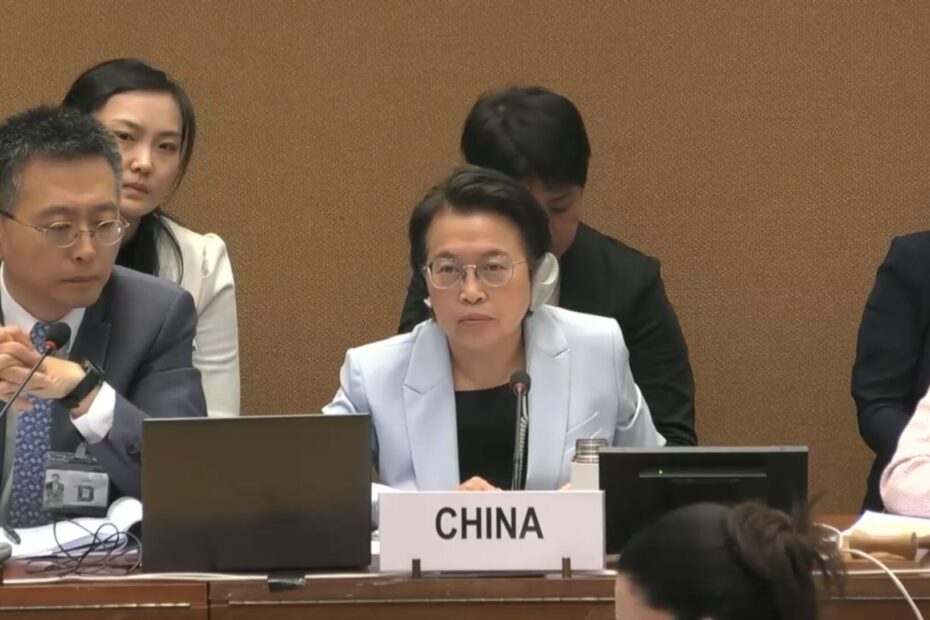30 May 2023
[Geneva] On 30 May, the UN Committee on the Elimination of Discrimination Against Women (CEDAW) [1] raised concerns about the Chinese Government’s coercive residential school system in Tibet and called for it to be abolished [2].
The findings were released in today’s report of the Committee, after it scrutinised the human rights record of the Chinese government on 12 May 2023 [2]. Tibet Advocacy Coalition [3] presented evidence to the Committee, raising in particular evidence that nearly 1 million Tibetan children have been separated from their families and communities and forced into colonial boarding schools [4], and the devastating impacts this is having on the culture, religion, and language of Tibetan girls.
The Committee raised concern about reports of “a coerced residential (boarding) school system imposed on Tibetan girls”. The Committee also raised the alarm over “the closure of schools providing instruction in minority languages, such as Tibetan”. In doing so, the UN experts reiterated the strong concerns of various other UN Committees and human rights bodies [5].
The Committee made a number of recommendations in relation Tibetans’ right to education, including that China should:
- Abolish the coerced residential (boarding) school system imposed on Tibetan girls and authorise the establishment of and subsidise private Tibetan schools.
- Ensure that girls and women belonging to the ethnic minorities have access to instruction in their mother tongue, such as Tibetan, Uyghur and Kazakh, and reverse the closure of schools providing instruction in minority languages.
The Committee also made a series of other strong Tibet-specific recommendations, including in relation to the labour transfer and “vocational training” programmes in that which “ relegate Tibetan women to training in low-skilled jobs and discard their unique skills;” and “undermine the religious, linguistic and cultural identity of Tibetan women”.
The Committee simultaneously raised concern over the confiscation of passports from Tibetan women and called on China to ensure that “passports are not confiscated on the basis of ethnic minority status and that national security legislation is not arbitrarily used to do so.”
Responding to the UN Committee’s conclusions regarding China’s compliance with the Covenant on the Elimination of Discrimination against Women, Tibet Advocacy Coalition said that the Chinese government must urgently ensure the effective implementation of the prohibition of discrimination against Tibetan women and girls, provide them with access to justice, end its forced assimilation policies which negatively impact Tibetan women and girls, and meaningfully address its human rights obligations.
Lhadon Tethong, Director of Tibet Action Institute, said:
“A global and growing chorus of voices is clearly saying: China must shut down its coercive system of colonial boarding schools in Tibet. And the time to do this is now.”
Lobsang Yangtso, Programme and Environment Coordinator, International Tibet Network, said:
“The reality is that there is no Tibetan education in Tibet and China’s colonial boarding schools are having a devastating impact on the well-being of an entire generation of Tibetan children. Today’s action call by UN experts is desperately needed as we reach a tipping point for the protection of the Tibetan way of life.”
Gloria Montgomery, Coordinator of Tibet Advocacy Coalition, said:
“The top UN women’s rights body has prioritised the rights of Tibetan women and girls by adding its voice to a growing list of UN experts and Member States who have raised the alarm on China’s assimilationist policies against Tibetan children. The Committee has made clear that China must abolish the residential schools system in Tibet and to allow Tibetan schools to be established.”
CONTACTS:
Gloria Montgomery, Tibet Advocacy Coalition: +44 7541 362001
Lhadon Tethong, Tibet Action Institute: +1 917-418-4181
Mandie McKeown, International Tibet Network: +44 7748 158618
Notes for Editors:
[1] The Committee on the Elimination of Discrimination against Women (CEDAW) is the body of independent experts that monitors implementation of the Convention on the Elimination of All Forms of Discrimination against Women. The CEDAW Committee consists of 23 experts on women’s rights from around the world.
[2] Committee on Elimination of Discrimination Against Women, Concluding Observations, 30 May 2023: https://tbinternet.ohchr.org/_layouts/15/treatybodyexternal/Download.aspx?symbolno=CEDAW%2FC%2FCHN%2FCO%2F9&Lang=en
[3] Tibet Advocacy Coalition is a project established in 2013 by International Tibet Network, Tibet Justice Center and Students for a Free Tibet to develop coordinated strategies, monitoring tools, and reports to highlight the situation in Tibet at the United Nations Human Rights Council. The Coalition core members are Tibet Justice Center, International Tibet Network Secretariat, Students for a Free Tibet, Tibetan Youth Association Europe, Tibet Action Institute and Tibet Initiative Deutschland.
[4] Tibet Action Institute, “Separated From Their Families, Hidden From the World: China’s Vast System of Colonial Boarding Schools Inside Tibet,” 2021, pg. 24, available at: https://s7712.pcdn.co/wp-content/uploads/2022/01/2021_ColonialBoardingSchoolReport_Digital.pdf
[5] Committee on Economic, Social and Cultural Rights, Concluding Observations, 6 March 2023: https://tbinternet.ohchr.org/_layouts/15/treatybodyexternal/Download.aspx?symbolno=E%2FC.12%2FCHN%2FCO%2F3&Lang=en; Special Procedures Communication, 11 November 2023: https://spcommreports.ohchr.org/TMResultsBase/DownLoadPublicCommunicationFile?gId=27444; Committee on the Elination of Racial Discrimination, September 2018, https://www.ohchr.org/en/documents/concluding-observations/cerdcchnco14-17-concluding-observations-combined-fourteenth
